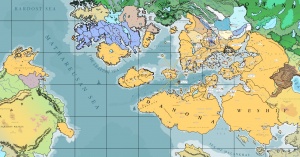Yophenthean Empire
The Yophenthean Empire comprises the period of Yophenthean rule beginning in the fourth century when Erechórebese military might expanded beyond the island. The Arathracian monarchy had firmly united all the Goldenling and Dramute tribes of Erechóreb in the third century and created the military and theocratic foundation for continued growth of the royal domains of the children of Arathrax. The fourth century is regarded by historians as the beginning of the empire as the Arathracian monarchy actively pursued its god-given mandate to bring all the world under the dominion of Arathrax and began the indoctrination and subjection of other peoples. The long duration and imperial extent of the Yophentheans ensured that their culture and religion would become a permanent element of the Pallathantic Region.
History
The Yophenthean Empire expanded with seemingly unstoppable momentum from the third to the seventh century. Thereafter until the early 800's, expansion reduced as the Yophenthean rulers exerted their efforts on containing the vast dominion of their forebears.
Asdarography and Demography
The Yophenthean Empire is largest of all human empires which history can vet. "It is not possible to study the Empire of the Yophentheans without long reflection on its superlative magnitude." Only the mythical empires of the titans and the gods were greater. At its greatest extent around 800 AI, the empire covered joined five continents and all the isles of the Pallathantic Sea under its rule. The Yophenthean Empire governed all of Danona, all of Pytharnia, the lands that are now Amerzcelindo, all of the lands that now comprise the Aurician Empire, all of Shelekhumbia and the western half of Weshif, including Shagrela'al, and the lands of southern Barathorn that now comprise Glaye. The Yophentheans called any land outside of their rule as the "Dawning Lands" and its intended use was chiefly for Thrace.
Languages
The official language of the Yophentheans was their own tongue, Classical Yophenthean, and they spread this tongue throughout their empire through conquest, religion, and theocratic bureaucracy. Colonization also brought the language greater permanency in the lands where Yophentheans emigrated and settled. However, the Yophentheans only insisted upon their language for the higher observances of their religion and official government business. Languages, including Classical Ithatian, Midretassene, and Khahonri were permitted and in many cases studied by Yophenthean governors to better inform their administration. The Midretassene Language continued as medium of culture and literacy in Corundian peninsula.
As the empire broke into
Classical Arathracianism
Theocracy and Military
Society
Economy
Architecture and Engineering
Arathracian Dome
The great, sprawling dome of the Arathracian Temple is the most well-known shape of Yophenthean Architecture and was employed in Temples and Basilicas. The first use of the dome on a large scale was in the late sixth century (ca 570) in Yophénthë for the great and high and holy Temple of Arathrax the Progenitor.
Samagolean Wall
The Arts
Literacy and Education
Literature
Legacy
References
Sources
See Also
- Goldenling Tribes of Erechóreb
- List of the Rulers of the Golden Empire of Pytharnia
- List of Yophenthean Rulers of Erechóreb
- Yophenthean Successor States
| This article is a stub. It requires further development by the creator. |
